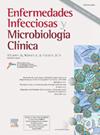The current status of arboviruses with major epidemiological significance in Europe
IF 2.6
4区 医学
Q3 INFECTIOUS DISEASES
Enfermedades infecciosas y microbiologia clinica
Pub Date : 2024-11-01
DOI:10.1016/j.eimc.2024.09.002
引用次数: 0
Abstract
Currently, an increasing impact of some arboviruses has been observed in Europe, mainly Dengue (DENV), Chikungunya (CHIKV), Zika (ZIKV), West Nile (WNV), and Crimean-Congo hemorrhagic fever (CCHFV) analyzed through a One Health perspective that considers their expansion across the continent. Arboviruses are primarily transmitted by vectors such as mosquitoes and ticks, with human activities and climate change playing crucial roles in their spread. The review highlights the ecological and epidemiological aspects of arboviruses, emphasizing the roles of diverse hosts and reservoirs, including humans, animals, and vectors, in their life cycles. The influence of climate change on the ecology of the vector, which potentially favors the arbovirus transmission, is also reviewed. Focusing on diagnosis, prevention and in the absence of specific treatments, the importance of understanding vector–host interactions and environmental impacts to develop effective control and prevention strategies is emphasized. Ongoing research on vaccines and therapies is crucial to mitigate the public health impact of these diseases.
欧洲具有重大流行病学意义的虫媒病毒现状
目前,一些虫媒病毒在欧洲的影响越来越大,主要是登革热(DENV)、基孔肯雅热(CHIKV)、寨卡热(ZIKV)、西尼罗河病毒(WNV)和克里米亚-刚果出血热(CCHFV),分析时采用了 "一体健康 "视角,考虑了这些病毒在欧洲大陆的扩展情况。虫媒病毒主要通过蚊子和蜱虫等载体传播,人类活动和气候变化对其传播起着至关重要的作用。综述突出了虫媒病毒的生态学和流行病学方面,强调了人类、动物和病媒等不同宿主和储库在虫媒病毒生命周期中的作用。气候变化对病媒生态的影响可能有利于虫媒病毒的传播,本文也对此进行了综述。文章以诊断和预防为重点,在缺乏特定治疗方法的情况下,强调了了解病媒与宿主之间的相互作用和环境影响对于制定有效的控制和预防策略的重要性。正在进行的疫苗和疗法研究对于减轻这些疾病对公共卫生的影响至关重要。
本文章由计算机程序翻译,如有差异,请以英文原文为准。
求助全文
约1分钟内获得全文
求助全文
来源期刊
CiteScore
2.10
自引率
8.00%
发文量
194
审稿时长
29 days
期刊介绍:
Hoy está universalmente reconocida la renovada y creciente importancia de la patología infecciosa: aparición de nuevos agentes patógenos, de cepas resistentes, de procesos con expresión clínica hasta ahora desconocida, de cuadros de una gran complejidad. Paralelamente, la Microbiología y la Infectología Clínicas han experimentado un gran desarrollo como respuesta al reto planteado por la actual patología infecciosa. Enfermedades Infecciosas y Microbiología Clínica es la Publicación Oficial de la Sociedad Española SEIMC. Cumple con la garantía científica de esta Sociedad, la doble función de difundir trabajos de investigación, tanto clínicos como microbiológicos, referidos a la patología infecciosa, y contribuye a la formación continuada de los interesados en aquella patología mediante artículos orientados a ese fin y elaborados por autores de la mayor calificación invitados por la revista.

 求助内容:
求助内容: 应助结果提醒方式:
应助结果提醒方式:


